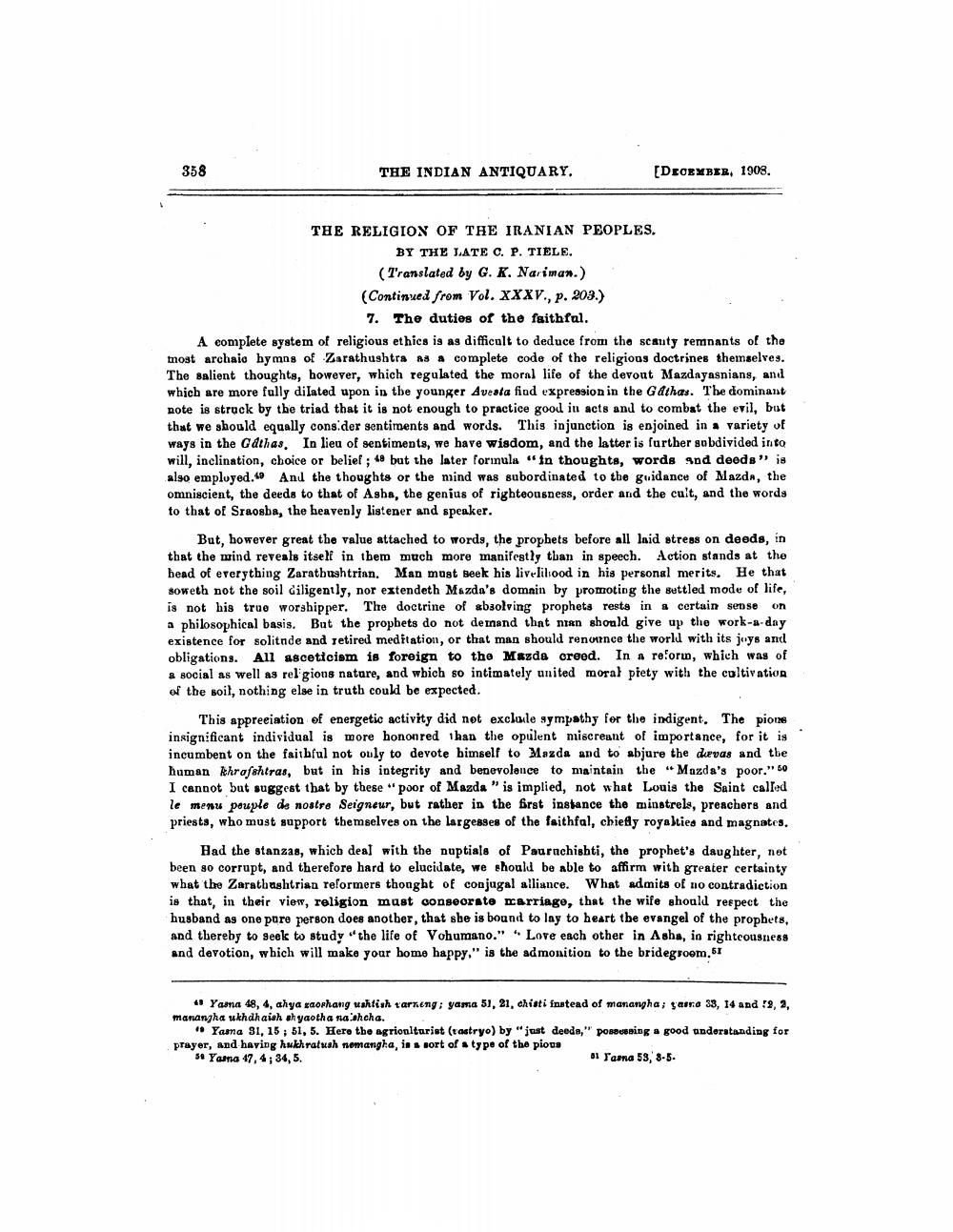________________
358
THE INDIAN ANTIQUARY.
[DEOEMBER, 1908.
THE RELIGION OF THE IRANIAN PEOPLES.
BY THE LATE C. P. TIELE. (Translated by G. K. Nariman.) (Continued from Vol. XXXV., p. 209.)
7. The duties of the faithful. A complete system of religious ethics is as difficult to deduce from the scauty remnants of the most archaio hymns of Zarathushtra as a complete code of the religious doctrines themselves. The salient thoughts, however, which regulated the moral life of the devout Mazdayasnians, and which are more fully dilated upon in the younger Avesta fiod expression in the Gathas. The dominant note is struck by the triad that it is not enough to practice good in acts and to combat the evil, but that we should equally consider sentiments and words. This injunction is enjoined in a variety of Ways in the Gathas, In lieu of sentiments, we have wisdom, and the latter is further subdivided into will, inclination, choice or belief ; but the later formula "in thoughts, words and deeds" is also employed. And the thoughts or the mind was subordinated to the guidance of Mazda, the omniscient, the deeds to that of Agha, the genius of righteousness, order and the cult, and the words to that of Sraosba, the heavenly listener and speaker.
But, however great the value attached to words, the prophets before all laid stress on deeds, in that the mind reveals itself in them much more manifestly than in speech. Action stands at the head of everything Zarathushtrian. Man must seek his livelihood in his personal merits. He that soweth not the soil Giligently, nor extendeth Mazda's domain by promoting the suttled mode of life, is not his true worshipper. The doctrine of absolving prophets rests in a certain sepse on a philosophical basis. But the prophets do not deinand that nian should give up the work-a-day existence for solitnde and retired meditation, or that man should renounce the world with its juys and obligations. All asceticism is foreign to the Mazda creed. In a relorun, which was of a social as well as religions nature, and which so intimately united moral piety with the coltivation of the soil, nothing else in truth could be expected.
This appreciation of energetic activity did not exclude sympathy for the indigent. The pione insignificant individual is more hononred than the opulent miscreant of importance, for it is incumbent on the faithful not ouly to devote himself to Mazda and to abjure the devas and the Human Rhrafshtras, but in his integrity and benevolence to maintain the "Mazda's poor." 50 I cannot but suggest that by these "poor of Mazda" is implied, not what Louis the Saint called le menu pouple de nostre Seigneur, but rather in the first instance the minstrels, preachers and priests, who must support themselves on the largesses of the faithfal, chiefly royalties and magnates.
Had the stanzas, which deal with the nuptials of Paurachishti, the prophet's daughter, not been so corrupt, and therefore hard to elucidate, we should be able to affirm with greater certainty what the Zarathashtrian reformers thought of conjugal alliance. What admits of no contradiction is that, in their view, religion must conseorste narriage, that the wife should respect the husband as one pare person does another, that sbe is bound to lay to heart the evangel of the prophets, and thereby to seek to study the life of Vohumano." "Love each other in Asha, in righteousness and devotion, which will make your home happy," is the admonition to the bridegroom.51
15 Yasna 48, 4, ahya zaoshangushtish tarnengi yana 51, 21, chisti fnstead of manangha; tasra 33, 14 and 12, 2, manangha ukhdhaish sk yaotha na ahcha.
** Yama 31, 15; 51, 5. Here the agrionlturist (rastryo) by "just deeda," POSBUBBing a good understanding for prayer, and having hukhratush nemangha, is a sort of a type of the pious 51 Yama 47, 4; 34,5.
01 Tasna 53, 8-5.




